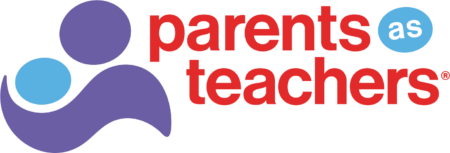More than twenty peer-reviewed published outcome studies including eight randomized controlled trials have been conducted on the effects of the Parents as Teachers model. Parents as Teachers works with a network of researchers to ensure independent research and evaluations are conducted that have integrity, credibility and minimize bias.

Research and Results

Research Methodology
Evaluations have been supported by various states, school districts, private foundations, universities, and research organizations. With each new evaluation, we continue to learn about the children and families served by Parents as Teachers and the long-term impacts on communities.
Equity in Research
Parents as Teachers is committed to using a racial equity lens to bring into perspective the ways in which race and ethnicity shape outcomes and to sharpen the focus on the outcomes expected of participation in Parents as Teachers. Research and evaluation inform model improvements that are made to ensure we are meeting the needs of families and children in all communities.
Parent as Teachers: Partnering with Black Families
Parents as Teachers: Partnering with Latinx Families
Parents as Teachers: Partnering with American Indian and Alaska Native Families
Research results from over 30 years of Parents as Teachers’ studies show:
- Early detection of children’s developmental delays and health concerns
- Increased indicators of child health
- Improved adaptive behavior, self-control, and mental health in children
- Kindergarten-ready children and successful students
- Improved parenting knowledge and skills
- Prevention of child abuse and neglect
- Supporting tribal communities
- Improved parent health behaviors
- Impact in other contexts of children and families
- Current and past research partnerships
- Parents as Teachers enrollment has a positive economic impact for families
Evidence-Based Home Visiting Brochure
Children’s Developmental Delays And Health Concerns Are Detected Early
Annually, Parents as Teachers finds approximately 32,000 newly identified developmental delays or health, hearing, or vision concerns in children.
Screening is one of the four dynamic components of the Parents as Teachers evidence-based model. Together, the closely interrelated and integrated components create the overall impact and contribution of Parents as Teachers. Screening provides regular information about each child’s health and developmental progress, increases parents’ understanding of their child’s development, and identifies strengths and abilities, as well as potential areas of concern like developmental delays.
When indicated, screening can provide the springboard for further comprehensive evaluations. Some children may be referred for additional services or diagnosed with a health condition, developmental disorder or disability. When needed, early intervention can enhance the parent-child relationship, resulting in improved family functioning and long-term positive effects on child development outcomes (Frankel & Gold, 2007).
Children Are More Likely To Be Immunized And Receive Well-Child Visits
Children enrolled in Parents as Teachers were five times more likely to be fully immunized.
Parents as Teachers works with parents to improve their ability to manage health and healthcare related activities, and to promote healthy child development. Through the developing relationship with the family, parent educators play a role in impacting parents’ sense of empowerment. Using Parents as Teachers’ strengths-based empowerment approach, parent educators recognize the immediate demands and work with parents to take action in the developing health of their children.
Parents as Teachers participation was significantly related to well-child visit attendance rates compared to non-PAT children
Children enrolled in Parents as Teachers were five times more likely to be fully immunized.
Parents as Teachers children are more likely to meet American Academy of Pediatrics (AAP) well-child visit recommendations. Parents as Teachers participation was significantly related to well-child visit attendance rates compared to non- Parents as Teachers children.
Children Show Better Adaptive Behavior, Self-Control, And Mental Health
Children enrolled in Parents as Teachers demonstrated higher levels of self-control at 36 months.
The overall Parents as Teachers approach and model for working with families is grounded in several theories and constructs that undergird the theory of change. The parent-child relationship provides a major context for much of early development, and the interactions between parents and children promote development in the major developmental domains. As parent educators partner with families, they provide research-based information around the developmental topics that connect child development and parenting behaviors. In this way, parent educators support the practice of developmental parenting, which in turn contributes to the family’s overall sense of well-being.
Parents as Teachers children showed lower rates of bottle feeding at night at 12, 24 and 36 months. Parents as Teachers children showed higher rates of sleeping through the night at 12, 24 and 36 months. Children enrolled in Parents as Teachers demonstrated higher levels of self-control at 36 months. Parents as Teachers interrupts the harmful effect of early life stress (ELS) on the brains of young children and demonstrates long-lasting positive biological effects on the mental health of children living in high-risk families.
Kindergarten-Ready Children And Successful Students
More than 75% of the low-income children who participated in Parents as Teachers and preschool were rated by their teachers as ready for kindergarten.
Children Enter Kindergarten Ready To Learn And The Opportunity Gap Is Narrowed
Parents as Teachers parent educators across the world help parents understand child development, support children’s learning, connect families with needed resources, and empower parents to make the best choices for their families. Thus, children’s school readiness is promoted through the processes of improved parenting capacity, parenting practices and parent-child relationships, and these improvements can be seen in the demonstration of positive parenting skills and quality parent-child interactions. These parenting behaviors lead to increases in a range of measurable school readiness indicators for Parents as Teachers children.
In addition, Parents as Teachers participation is demonstrated to show lasting changes to positive parenting skills and quality parent-child interactions such that the impact can be seen as children move through school. Parents as Teachers children scored higher on measures of initiative, achievement, language ability, vocabulary, social development, persistence in task mastery and other cognitive abilities. Parents as Teachers combined with quality preschool education reduced opportunity inequities between low-income and more advantaged children at kindergarten entry. More than 75% of the low-income children who participated in Parents as Teachers and preschool were rated by their teachers as ready for kindergarten. Teachers rated Parents as Teachers children significantly higher than non-Parents as Teachers children on multiple developmental indicators of school readiness (emotional well-being, fine motor, expressive language, receptive language and social competence).
Children Achieve School Success Into The Elementary Grades
Children in Parents as Teachers scored higher on standardized measures of reading, math and language at kindergarten entry and later grades. Compared to non-Parents as Teachers children, Parents as Teachers children required half the rate of remedial and special education placements in 3rd grade. Parents as Teachers children performed significantly better on school standardized tests for reading, comprehension, phonics, math, and English Language Learners reading and writing compared to non- Parents as Teachers students. Parents as Teachers children had a significantly lower average rates of absenteeism and lower number of suspension days compared to non-Parents as Teachers students. Parents as Teachers children in the first year of kindergarten showed better German skills, higher self- regulation and fewer behavioral problems.
Parents Improve Their Parenting Knowledge And Skills, Provide Language-Rich Experiences, And Participate In Children’s Schooling
63% of Parents as Teachers parents (versus 37% of non-Parents as Teachers parents) requested parent-teacher conferences.
Parents Improve Their Parenting Knowledge And Skills
Parents as Teachers mothers demonstrated more sensitivity to their children than non-Parents as Teachers mothers. Maternal sensitivity was directly connected to positive outcomes on child vocabulary. Parents as Teachers parents showed significant improvements in parent knowledge, parenting behavior and parenting attitudes. Teen mothers showed greater improvement in knowledge about discipline and organized their home environment in a more appropriate way.
Families Are More Likely To Promote Children’s Language And Literacy
Parents as Teachers families with very low income were more likely to read aloud to their children and to tell stories, say nursery rhymes and sing with their children. Over 75% of parents in Parents as Teachers reported taking their child to the library regularly and modeling enjoyment of reading and writing. Parents engaged in more language and were more likely to promote reading in the home. Parents as Teachers families have more books at home. Average parenting quality and interactive reading scores increased from Parents as Teachers involvement.
Parents Are More Involved In Their Children’s Schooling
63% of Parents as Teachers parents (versus 37% of non-Parents as Teachers parents) requested parent-teacher conferences. Parents as Teachers parents were more likely to enroll their children in preschool, attend parent-teacher conferences, PTA/PTO meetings and school events, volunteer in the classroom and talk with their children’s teacher.
Child Abuse And Neglect Is Prevented
Parents as Teachers families had a 22% decreased likelihood of child maltreatment substantiations and was associated with a significantly lower likelihood of Child Protective Services recidivism.
According to the US Department of Health; Human Services, Administration for Children Families, child abuse prevention efforts are generally recognized as occurring along three levels:
- primary prevention directed at the general population to prevent maltreatment before it occurs (universal)
- secondary prevention targeted to individuals or families in which maltreatment is more likely (high risk)
- tertiary prevention targeted toward families in which maltreatment has already occurred (indicated)
The ideal approach to prevention encompasses all three levels, which results in a comprehensive service framework focused on improving outcomes for children and families.” Parents as Teachers operates within the secondary and tertiary levels of child abuse prevention and has accumulated strong evidence that it is effective with at-risk families as well as families with previous experience with the child welfare system in improving outcomes for children and families. Parents as Teachers children had a 22% decreased likelihood of child maltreatment substantiations (as measured by Child Protective Services maltreatment data) compared to children not in Parents as Teachers.
Families that had prior engagement with Child Protective Services found that among non-depressed mothers, Parents as Teachers was associated with a significantly lower likelihood of Child Protective Services recidivism. Children in Parents as Teachers are less likely to go to the emergency room to be treated for injury. Parents as Teachers participation was related to 50% fewer cases of suspected abuse and/or neglect.
CLICK HERE FOR OUR PREVENTION OF CHILD ABUSE AND NEGLECT FACT SHEET
Parents As Teachers Supports Parents In Tribal Communities
Parents as Teachers uniquely addresses the distinct challenges facing American Indian and Alaska Native (AIAN) families by leveraging strengths of their communities.
Our tribal affiliate programs are culturally specific, locally implemented and use community-based paraprofessionals, which support the local workforce development. The program honors cultural heritages, tribal teachings, practices, traditions, values, beliefs and incorporates diverse cultural strengths and language into every personal visit. The Parents as Teachers model is often enhanced to use Native language, incorporating traditional arts, crafts, storytelling, and connecting families to tribal events.
Some tribal programs are operated through Family and Child Education (FACE) – a partnership between the federal Bureau of Indian Education, the National Center for Families Learning and Parents as Teachers National Center. FACE is a unique family program for American Indian families that matches highly trained, local, Native, professionals with families from pregnancy through their children’s first years of life. Across its 30+ year history, FACE has demonstrated positive impacts for children and families. It has been shown to:
- Increase the amount of time parents spend with their child.
- Increase parents’ involvement with their child’s education.
- Improve effective parent interaction with their child.
- Increase parents’ understanding of child development.
- Decrease behavioral concerns in toddlers.
Parents As Teachers Delivered With A Focus On Health And Obesity Prevention Reduced Obesity And Improved Health
Parents as Teachers parents improved dietary intake, knowledge and parental modeling compared to the comparison parents.
20 years of collaborative work with Parents as Teachers, led by Dr. Debra Haire-Joshu and colleagues, have illuminated the systemic racism present in health care systems and how interventions can change these systems to promote better outcomes for Black families. Weight gain during pregnancy and postpartum are important causes of long-term weight gain and the development of obesity-related diseases among women. Moreover, excessive weight gain during pregnancy can have adverse long-term effects on child health. The prevalence of being overweight and obese is high among Black women, particularly those who are underserved and socioeconomically disadvantaged.
Women with obesity are at risk of excessive gestational weight gain during pregnancy and have greater weight retention one year after delivery, thereby increasing the severity of their obesity and the risk of obesity-related medical issues. Although lifestyle intervention is recommended for pregnant women with obesity to prevent excessive gestational weight gain and postpartum weight retention, providing effective real-world therapy for socioeconomically disadvantaged women is difficult because of the many barriers to program participation related to parenting responsibilities, costs, limited transportation and other stressors. The compilation of research evidence supports Parents as Teachers as a home visiting model with positive outcomes for Black families and children.
Parents as Teachers parents improved dietary intake, knowledge and parental modeling compared to the comparison parents. Parents as Teachers children improved fruit and vegetable consumption and parents improved food preparation skills compared to the comparison parents.
Parents as Teachers mothers gained less weight weekly and total during gestation and through 12 months postpartum than the comparison mothers. Parents as Teachers children demonstrated improvements in behavioral outcomes compared to the comparison children. Parents as Teachers mothers were significantly more likely to improve, reduce intake of soda and other
sugar-sweetened beverages, and increased physical activity compared to the comparison mothers. Parents as Teachers mothers were significantly more likely to achieve weight loss and reduced weight circumference compared to the comparison mothers.
Parents As Teachers Supports Children And Families Served In Other Settings
Within family childcare settings, significant increases in program quality are seen for family childcare providers receiving PAT home visits.
In addition to research on the Parents as Teachers model and innovations and adaptations of the evidence-based model, Parents as Teachers has also developed and investigated stand-alone
interventions apart from the model. These interventions focus on expanding Parents as Teachers’ reach to supporting families and children in other contexts that children grow and develop, such as with family childcare and with stand-alone parenting groups. Rigorous, independent evaluation has demonstrated that these efforts show impacts for children and families.
Current And Past Research Partnerships
Parents as Teachers invests in research partnerships in order to consistently validate our model.
Parents as Teachers has a long history of partnering with researchers and institutions to investigate the impacts of the Parents as Teachers model and to facilitate rigorous, independent research. Innovations born out of these collaborations have also been replicated and scaled up.
Parent Support Program Proven to Improve Employment and Education Outcomes for Caregivers
After one year of participation with Parents as Teachers, caregivers were 16 percent more likely to become employed, 69 percent more likely to enroll in high school, if they had not completed, and 12 percent more likely to enroll in college, when compared to their peers.
The Parents as Teachers model components support seven goals that support families’ overall health. One of these goals focuses on improving family economic well-being. As part of their home visits, Parents as Teachers families set goals that support overall family financial health.
The Exploring Employment and Education Outcomes for Caregivers Participating in Parents as Teachers study was done in partnership between James Bell Associates and the Parents as Teachers National Center to evaluate the effectiveness of the Parents as Teachers home visiting model. The organizations examined outcomes in education, employment, and income for caregivers who participated in Parents as Teachers and compared them to data collected through the Current Population Survey Annual Social and Economic Supplement. Overall, we found significant increases in employment and education for PAT caregivers relative to the comparison group. These findings suggest that caregivers participating in PAT are more likely to obtain employment and to enroll in high school or college compared to those who did not. These circumstances create better economic environments for families.
New Analyses of Parents As Teachers Reveal Broader Impacts For Participating Families
MIHOPE provides a comprehensive assessment of home visiting in the United States. Using an intent to treat (ITT) approach, MIHOPE likely underestimates the impact of home visiting. For instance, 21% of MIHOPE families assigned to PAT did not actually receive any home visiting, yet they were included in the PAT treatment group for analysis. A new, 3-part analysis limits the treatment group to those who received at least three months of PAT, using propensity score matching (PSM) to create a well-matched comparison group. Limiting the treatment group in this way—while still controlling for selection bias—shows PAT produces a more robust set of family outcomes across five domains – including Family Economic Self-Sufficiency, Parenting, Child Maltreatment, Child Health, and Child Development.
In addition, as PAT’s Foundational Curricula is used optionally across home visiting models, it is possible the curricula itself is related to some family outcomes, independent of the full PAT model. Analyses compared two treatment groups (families who received the full PAT model and families receiving the PAT curriculum with another home visiting model) and a matched comparison group. Four outcomes (in the areas of Child Development, Child Maltreatment, Parenting, and Family Economic Self-Sufficiency) were significant for both treatment groups, suggesting these outcomes are more likely to be related to the Foundational Curricula rather than to other features of the home visiting models.
A final analysis disaggregated data to understand for whom PAT works and how. Stratifying on race and ethnicity, we find that each racial/ethnic group had at least one unique outcome not found for the other groups. Black families in PAT experienced the greatest number of significant outcomes compared to similar families not in PAT. Stratifying by other family characteristics demonstrates significant findings among certain characteristics. Findings across the additional eight family characteristics assessed suggest that PAT can achieve different outcomes for different types of families. These findings can be used to consider how to tailor the program to better support individual families.
Taken together, all of these findings suggest PAT may have a more comprehensive effect on key facets of daily life for young children and their families that form the foundation for children’s long-term well-being.

Are you currently conducting an evaluation of Parents as Teachers or are you interested in conducting research?
We strongly encourage evaluation of Parents as Teachers at the local and state levels. If you are interested in conducting a Parents as Teachers evaluation, please contact us:

